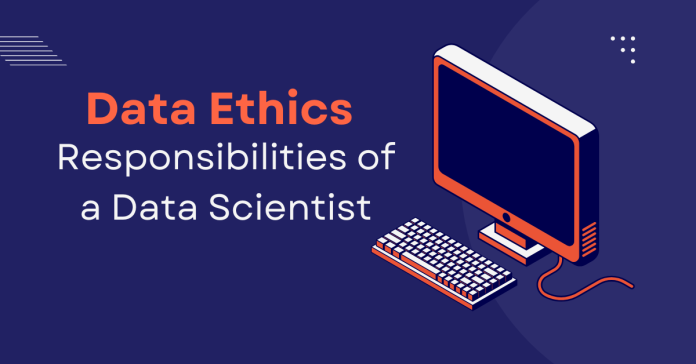In this post, I will talk about data ethics and highlight a data scientist’s responsibilities.
Data ethics refers to data scientists’ moral responsibilities in handling, evaluating, and sharing data. It emphasizes principles such as transparency, fairness, privacy, and accountability to protect individuals’ rights and ensures that the data is used responsibly.
Data scientists have the responsibility not to be biased, respect data privacy, and ensure that their models and analysis do not harm individuals or society.
They must also communicate findings clearly and be aware of the ethical implications of their work. Upholding data ethics is crucial for maintaining public trust, ensuring fairness, and promoting the responsible use of data for positive societal impact.
Table of Contents
Data Science
Data science is a multidisciplinary field that makes use of the statistical analysis, machine learning, and data processing to extract meaningful insights from large datasets.
It is rapidly becoming the backbone of decision-making in industries like healthcare, finance, retail, and technology, helping organizations predict trends, improve efficiency, and enhance customer experiences.
Enrolling in a data science course can benefit those interested in this exciting field. These courses cover essential topics like programming (Python, R), data visualization, machine learning, and big data tools, providing a comprehensive foundation.
With hands-on projects and real-world case studies, learners gain practical experience and problem-solving skills. A structured course helps you understand data workflows, apply models effectively, and solve complex problems, making it easier to confidently enter the workforce and stay competitive in an evolving data-driven world.
READ ALSO: A Look at New Forms of Marketing and How to Implement Them
Who is a data scientist?
A data scientist is a professional who evaluates large datasets to gain meaningful insights and support data-driven decision-making. They combine skills in statistics, programming, and machine learning to find patterns, build predictive models, and provide actionable solutions.
Data scientists makes use of the programming languages such as; Python or R for data analysis, and they work with SQL to manage databases. They apply machine learning algorithms to predict trends and identify business opportunities.
Beyond technical skills, data scientists need critical thinking to ask the right questions, and communication skills to present insights clearly to stakeholders. They work across diverse industries, such as healthcare, finance, marketing, and technology, helping organizations solve problems, make strategic decisions, and innovate effectively.
READ ALSO: How to Share E-Books with Family and Friends
Roles and Responsibilities of a Data Scientist
- Data Collection and Preparation: Gather and clean data from various sources to ensure quality and reliability for analysis.
- Data Exploration and Analysis: Perform exploratory data analysis (EDA) to uncover patterns, trends, and relationships within the data.
- Building Predictive Models: Develop and train machine learning models to make predictions or classifications based on historical data.
- Data Visualization: Use visualization tools (like Tableau, Matplotlib) to present data insights visually and comprehensibly for stakeholders.
- Business Problem Solving: Work closely with business stakeholders to define problems, convert them into data science tasks, and give actionable insights.
- Model Evaluation and Optimization: analyse model performance, optimize algorithms, and tune hyperparameters to improve accuracy and efficiency.
- Reporting and Communication: Communicate findings clearly to non-technical teams, providing strategic recommendations based on data-driven insights.
- Staying Updated: Stay up-to-date with advancements in data science tools, technologies, and best practices to deliver up-to-date solutions.
These responsibilities allow data scientists to effectively bridge the gap between data and business needs.
The Ethics For Data Science
Data Privacy and Consent
Data scientists must respect individuals’ privacy and collect data only with informed consent. Proper anonymization techniques should be used to protect personal information.
Transparency and Accountability
Be transparent about data collection methods, analysis, and models used. Data scientists should be accountable for their work and clearly communicate potential risks or limitations of their findings.
Avoiding Bias
Bias in data and algorithms can lead to unfair outcomes. Data scientists should work to detect and reduce bias in their models to ensure fair, unbiased results.
Data Security
Maintaining data security is crucial to prevent unauthorized access or data breaches. Data scientists are responsible for safeguarding sensitive information during analysis.
Responsible Use of Data
Data scientists should ensure data is used responsibly, avoiding unethical uses like manipulating findings for misinformation or using data for unintended purposes.
These ethical practices are essential for building trust, ensuring fair outcomes, and promoting the responsible use of data in society.
READ ALSO: 7 Business Credit Card Tips For Small Businesses
What Role Does Ethics Play In Gaining Expertise In Data Science?
Ethics plays a crucial role in gaining expertise in data science by ensuring data is used responsibly and for the benefit of society.
As data scientists handle vast amounts of sensitive information, ethical considerations like data privacy, transparency, fairness, and accountability are vital for maintaining public trust.
Ethical practices help develop unbiased models, protect user data, and avoid misuse of information.
A data science certification course often includes modules on ethical data handling, providing guidelines on respecting privacy, mitigating biases, and using data securely. These courses teach technical skills and the moral responsibilities of a data scientist.
By mastering these ethical principles, data professionals can create more impactful and trustworthy solutions, making them well-rounded experts. Ethics is not just about compliance; it’s about building a reputation of integrity, which is key for long-term success in the data science field.
Summed Up
Data ethics is a fundamental part of the responsibilities of a data scientist, ensuring that data is used in a fair, transparent, and secure manner.
By respecting privacy, avoiding bias, and being accountable for their actions, data scientists help maintain public trust and contribute to positive societal impacts. Ethical data practices not only protect individuals’ rights but also enhance the credibility and reliability of data-driven insights.
Upholding strong ethical standards is crucial for data scientists to create meaningful, unbiased solutions that serve both business interests and the broader community responsibly and effectively.
INTERESTING POSTS
- The Benefits Of Studying Data Science Technology
- Ethical Considerations in GRC Decision-Making and Risk Management
- Roles And Responsibilities Of An Ethical Hacker
- Ways Manufacturers Can Benefit from Going Online
- Exploring Model Monitoring Tools and Platforms for Effective Deployment
- AI Transforming Manufacturing Innovation, Branding, and Customer Interactions
About the Author:
Christian Schmitz is a professional journalist and editor at SecureBlitz.com. He has a keen eye for the ever-changing cybersecurity industry and is passionate about spreading awareness of the industry's latest trends. Before joining SecureBlitz, Christian worked as a journalist for a local community newspaper in Nuremberg. Through his years of experience, Christian has developed a sharp eye for detail, an acute understanding of the cybersecurity industry, and an unwavering commitment to delivering accurate and up-to-date information.








